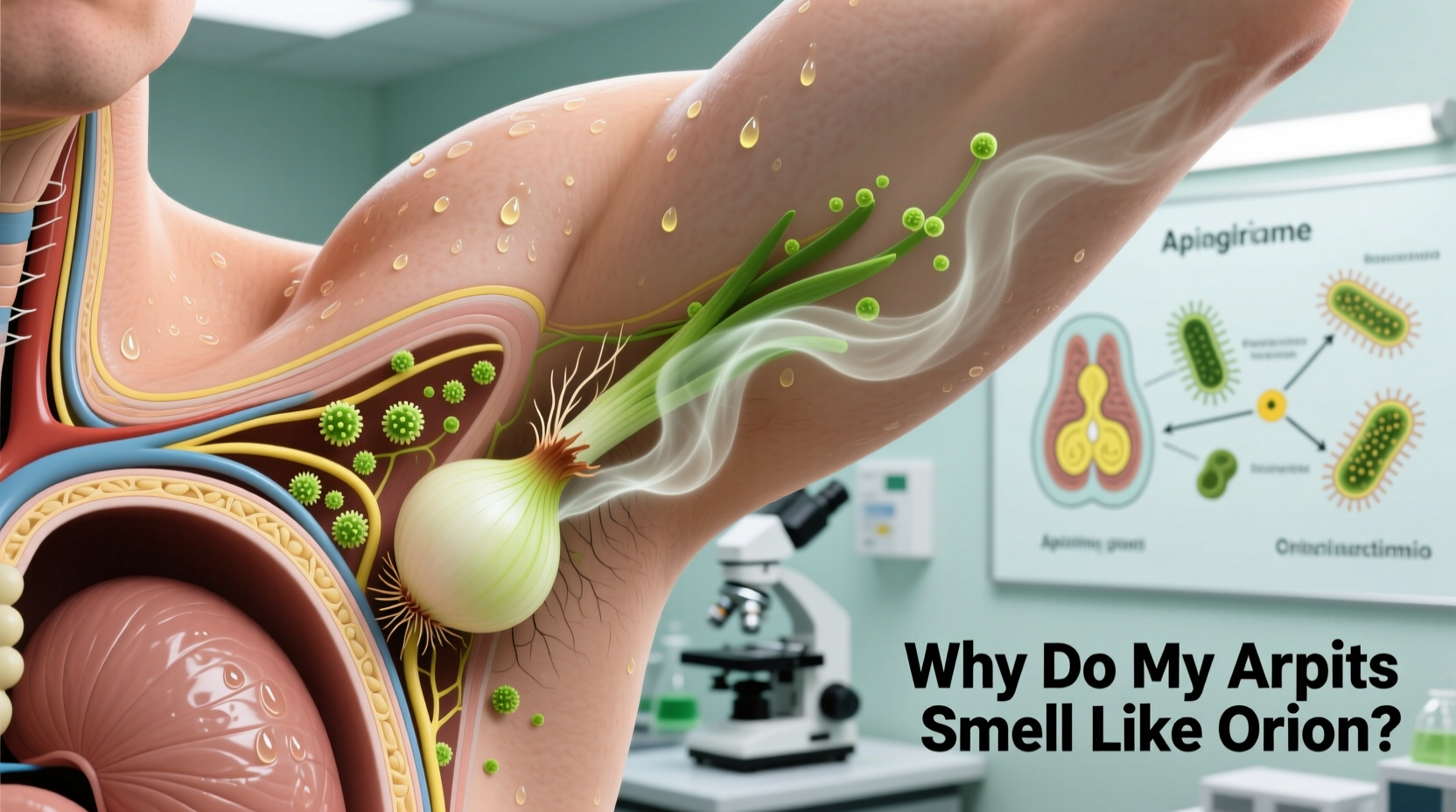The Science Behind Onion-Scented Sweat
When you consume foods rich in organosulfur compounds—like onions, garlic, broccoli, and cabbage—your body breaks them down during digestion. These compounds enter your bloodstream and are eventually processed by your liver. The resulting metabolites, including volatile sulfur compounds, are then excreted through your sweat, breath, and urine.
Unlike eccrine sweat glands (which cover most of your body and produce mostly water and salt), your apocrine glands in the armpits produce a thicker fluid containing proteins and lipids. When bacteria on your skin break down these compounds, they release odorous byproducts that can carry distinct food-related scents—including that unmistakable onion aroma.
| Food Source | Key Compounds | Odor Manifestation Timeline |
|---|---|---|
| Onions & Garlic | Allyl methyl sulfide | 1-2 hours after consumption |
| Cruciferous Vegetables | Sulforaphane | 3-5 hours after consumption |
| Red Meat | Carnosine metabolites | 24+ hours after consumption |
Why This Happens: 4 Primary Causes
1. Dietary Factors (Most Common)
Consuming large quantities of allium vegetables (onions, garlic, leeks) introduces significant sulfur compounds into your system. A 2022 study published in Nutrients found that individuals who consumed 50g of raw garlic experienced detectable sulfur metabolites in their sweat for up to 48 hours. Cruciferous vegetables like broccoli and cabbage contain similar compounds that can produce comparable effects.
2. Genetic Metabolism Variations
Some people naturally metabolize sulfur compounds more slowly due to genetic variations in their CYP2E1 enzyme activity. According to research from the National Institutes of Health, approximately 15% of the population processes these compounds at a significantly slower rate, leading to more pronounced body odor effects from the same dietary intake.
3. Gut Microbiome Composition
Your gut bacteria play a crucial role in breaking down food compounds before they enter your bloodstream. An imbalance in your microbiome (dysbiosis) can alter how sulfur compounds are processed. A 2023 review in Gut Microbes journal noted that individuals with higher levels of Bacteroides species tend to produce more volatile sulfur compounds from dietary sources.
4. Underlying Medical Conditions (Rare)
While uncommon, persistent onion-like body odor could indicate metabolic disorders like trimethylaminuria (fish odor syndrome), which affects the body's ability to break down certain nitrogen compounds. The National Organization for Rare Disorders reports this condition affects approximately 1 in 65,000 people and often presents with unusual body odors that don't match typical dietary causes.

When to Consult a Healthcare Professional
While dietary-related body odor is typically harmless, seek medical advice if you notice:
- Odor persists for more than 72 hours after eliminating suspect foods
- Body odor changes suddenly without dietary explanation
- Accompanying symptoms like excessive sweating, weight loss, or fatigue
- Noticeable odor in urine or breath that doesn't correlate with recent meals
The American Academy of Dermatology recommends consulting a board-certified dermatologist if unusual body odor significantly impacts your quality of life or social interactions. They can perform tests to rule out metabolic conditions and provide targeted treatment options.
Effective Solutions to Reduce Onion-Scented Sweat
Dietary Adjustments
Implement these evidence-based dietary strategies:
- Time your consumption: Eat sulfur-rich foods earlier in the day to allow more time for metabolization before social activities
- Pair with chlorophyll-rich foods: Consume parsley, spinach, or wheatgrass which can help neutralize odor compounds
- Stay hydrated: Drink at least 2L of water daily to help flush metabolites more quickly
- Cook vegetables: Raw alliums produce stronger odors than cooked versions—try roasting onions to reduce sulfur volatility
Topical Solutions
These clinically tested approaches can help manage odor:
- Antimicrobial washes: Use soap with 2% chlorhexidine gluconate to reduce odor-causing bacteria
- Aluminum-free deodorants: Try magnesium-based products which neutralize odor without blocking pores
- Apple cider vinegar rinse: Dilute 1 part vinegar with 2 parts water and apply to clean armpits (pH 3-4 helps inhibit bacterial growth)
Lifestyle Modifications
Implement these practical changes for longer-term improvement:
- Cotton clothing: Wear breathable natural fibers that wick moisture away from skin
- Post-meal oral hygiene: Brush teeth and use tongue scraper after consuming sulfur-rich foods
- Stress management: Practice deep breathing techniques as stress activates apocrine glands
Preventing Future Occurrences
Develop these sustainable habits to minimize recurrence:
- Maintain consistent hydration patterns throughout the day
- Incorporate probiotic-rich foods like yogurt and kefir to support healthy gut flora
- Establish a twice-daily cleansing routine using pH-balanced cleansers
- Track your diet and body odor patterns in a journal to identify personal triggers
Common Misconceptions About Food-Related Body Odor
Many people believe that simply avoiding onions will solve the problem, but research shows that multiple dietary factors interact to create body odor. The Journal of Investigative Dermatology published findings that individual sensitivity varies dramatically—what causes strong odor in one person may have no effect on another due to genetic and microbiome differences.
Another common myth is that stronger deodorants are always better. In reality, harsh chemicals can disrupt your skin's natural microbiome, potentially worsening odor over time. Dermatologists recommend rotating between different active ingredients to prevent bacterial resistance.











 浙公网安备
33010002000092号
浙公网安备
33010002000092号 浙B2-20120091-4
浙B2-20120091-4